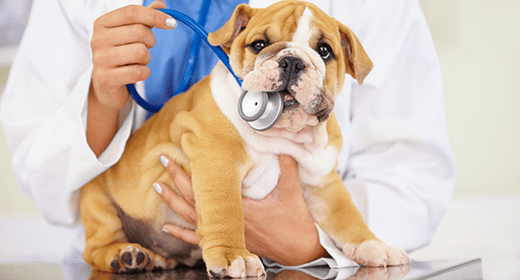

Your puppy will grow the fastest during the first six months of his life, so you’ll want to take special care to plan a healthy diet from the start. “Growing puppies have a lot more energy than adult dogs,” says Madan Khare, DVM. “They require more nutrients in each bite because they can’t eat in large quantities.” Here’s everything you need to know about feeding your puppy, including what food to choose, how often to feed him and how to handle treats and teething.
Look for a premium puppy food with key ingredients such as animal-based proteins (chicken, beef or lamb) for strong bones, and energy-rich fatty acids (omega-6 and omega-3 are two) for a healthy skin and coat. When perusing the products at your grocery store, don’t be tempted by the low-cost brands in the huge bags. They may contain lower-quality ingredients and artificial preservatives and may not provide your dog the with optimal nutrition he needs.
Premium puppy food, such as IAMS™ ProActive Health™ Smart Puppy, is more easily digested and has additional nutritional value, containing nutrients such as DHA that are naturally found in milk from the puppy’s mother. Discuss with your vet and read package labels to determine an appropriate formula for your dog’s breed and size.
Create a clean, quiet spot for your puppy to eat, preferably in the kitchen. Additionally, provide your pup with fresh water in a clean bowl at all times, even outdoors. You may want to place a mat beneath both bowls to easily clean up spills or crumbs and keep the area tidy.
Develop a consistent eating schedule that coordinates with yours. At first, feed your puppy three times a day (consult your vet about proper quantities). After four months, twice daily should be fine.
'Feed your puppy while you eat your breakfast, lunch and dinner,' Khare suggests. Your puppy will learn that you eat at the table and he eats from his bowl. This will deter any tendency to beg. “He'll appreciate the bonding time, too,” Khare adds.
Premium dry food, such as IAMS™ ProActive Health™, is your best bet for balanced nutrition, value and convenience. When stored properly, it’ll stay fresh longer than moist food — and it requires fewer cleanups.
For a teething puppy, you may want to mix dry food into moist food.
Use vet-recommended treats when training your dog, but with moderation. Don't offer human food, though — it may do more harm than good because it won’t have the important nutrients your pet needs.




Congratulations! You're the proud owner of a puppy. It's important to take steps now to ensure great puppy health. Louise Murray, DVM, director of the ASPCA's Bergh Memorial Animal Hospital in New York City and author of Vet Confidential (Ballantine, 2008), offers these pointers for your puppy's first year.
Talk to friends to find a veterinarian you can trust. Within a week of bringing your puppy home, take him for a checkup. The doctor will perform a physical and start keeping a detailed medical history.
The overvaccination of pets is currently a hot topic, Murray says. The question is, however, not whether to vaccinate but which vaccines to use and how often. What she calls the 'core vaccines'—those for parvovirus, distemper, adenovirus type 2, and rabies—are essential. 'These shots protect your dog from diseases that are very real, very common, and very dangerous,' she says. Additional vaccines may be necessary based on where you live, where you take your dog, and whether you travel.
Choose a reputable brand of dog food and discuss your choice with your veterinarian. In his first year, your puppy will be on food that is specifically geared toward younger dogs and will likely eat three times a day rather than once or twice.
An excellent measure against pet overpopulation, this procedure ideally should be performed between ages 4 and 5 months, which is before a female dog goes into her first heat and before a male enters puberty. A female dog who is spayed before going into heat is 2,000 times less likely to get breast cancer, Murray says. Males who are neutered before entering puberty have fewer behavioral issues, such as aggression toward other dogs and urine marking.
Puppy Health: Flea, Tick, and Heartworm Medicines
Most dogs should be on medicine year-round to prevent heartworm, a life-threatening parasitic infestation, Murray says. Fleas, often seen as just an annoyance, can actually cause severe skin problems and even anemia. Ticks carry multiple diseases (including Lyme disease and Rocky Mountain Spotted Fever). Your veterinarian can prescribe effective preventives for these two problems.